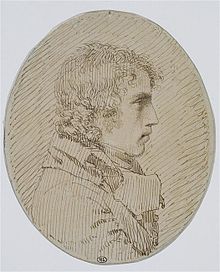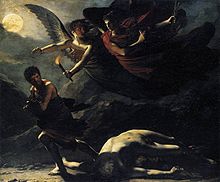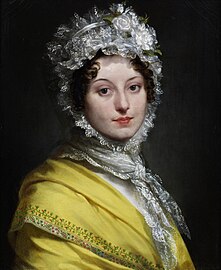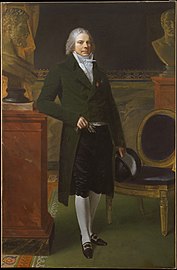Pierre-Paul Prud'hon
Pierre-Paul Prud'hon | |
|---|---|
 Prud'hon's only known self-portrait, c. 1788–1790 | |
| Born | 4 April 1758 |
| Died | 16 February 1823 (aged 64) Paris, France |
| Nationality | French |
| Known for | Painting, drawing |
| Notable work | Madame Georges Anthony and Her Two Sons |
| Movement | Neoclassicism, Romanticism |
Pierre-Paul Prud'hon (French pronunciation: [pjɛʁ pɔl pʁydɔ̃], 4 April 1758 – 16 February 16, 1823) was a French Romantic painter and draughtsman best known for his allegorical paintings and portraits such as Madame Georges Anthony and Her Two Sons (1796). He painted a portrait of each of Napoleon's two wives.
He was an early influence on Théodore Géricault and Marie-Françoise Constance Mayer La Martinière (9 March 1775 – 26 May 1821),who may have influenced him as well, due to their intimate working relationship.
Biography
[edit]
Pierre-Paul Prud'hon was born in Cluny, Saône-et-Loire, France. He received his artistic training in the French provinces and went to Italy when he was twenty-six years old to continue his education. On his return to Paris, he found work decorating some private mansions, often allegorical works such as The Soul Breaking the Links Holding it to the Earth and The Dream of Happiness. His work for wealthy Parisians led him to be held in high esteem at Napoleon's court.
His painting of Josephine portrays her not as an Empress, but as an attractive woman, which led some to think that he might have been in love with her. After the divorce of Napoleon and Josephine, he was also employed by Napoleon's second wife Marie-Louise.
Prud'hon was at times clearly influenced by Neo-classicism, at other times by Romanticism. He was appreciated by other artists and writers, including Stendhal, Delacroix, Millet and Baudelaire, for his chiaroscuro and convincing realism. He painted Crucifixion (1822) for St. Etienne's Cathedral in Metz; it now hangs in the Louvre.
The young Théodore Géricault had painted copies of work by Prud'hon, whose "thunderously tragic pictures" include his masterpiece, Justice and Divine Vengeance Pursuing Crime, where oppressive darkness and the compositional base of a naked, sprawled corpse obviously anticipate Géricault's painting The Raft of the Medusa.[1]
Gallery
[edit]-
Male Nude Study, National Gallery of Art
-
Portrait of Louis de Saint-Just, 1793
-
Nicolas Perchet, 1795, Princeton University Art Museum
-
Female Nude, 1800
-
Portrait of Charles Maurice de Talleyrand-Périgord, 1817
-
Study for The Dream of Happiness (with Constance Mayer), 1819
References
[edit]- ^ a b Gayford, Martin. "Distinctive power". The Spectator, November 1, 1997. Retrieved from findarticles.com on January 6, 2008.
Further reading
[edit]General studies
[edit]Adapted from a following source: Freitag, Wolfgang M. (1997) [1985]. Art Books: A Basic Bibliography of Monographs on Artists (2nd ed.). New York, London: Garland. p. 327, entries nos. 10041–10049. ISBN 0-8240-3326-4.
- Bricon, Etienne (1907). Prud'hon: biographie critique (in French). Paris: H. Laurens. OCLC 1051736394 – via the Internet Archive.
- Clément, Charles (1872). Prud'hon: sa vie, ses œuvres et sa correspondance (in French). Paris: Didier et Cie. OCLC 1051761864 – via the Internet Archive.
- Forest, Alfred (1913). Pierre-Paul Prud'hon : peintre français (1758-1823) (in French). Paris: E. Leroux – via Gallica.
- Friedlaender, Walter (1952). David to Delacroix (6th printing, 1974). Cambridge, MA: Harvard University Press. ISBN 978-0-674-19401-4. OCLC 1029048561. SBN 674-19401-2 – via the Internet Archive.
- Gauthiez, Pierre (1886). Prud'hon. Les Artistes Célèbres. Paris: J. Rouam. OCLC 848495507 – via the Internet Archive.
- Goncourt, Edmond de (1876). Catalogue raisonné de l'œuvre peint, dessiné et gravé de P.P. Prud'hon (in French). Paris: Rapilly. OCLC 1041796905 – via the Internet Archive.
- Grappe, Georges (1958). Prud'hon (in French). Paris: A. Michel. OCLC 2502696.
- Guffey, Elizabeth E. (2001). Drawing an Elusive Line: The Art of Pierre-Paul Prud'hon. Newark: University of Delaware Press. ISBN 0-87413-734-9. OCLC 46462851.
- Guiffrey, Jean (1924). L'œuvre de Pierre-Paul Prud'hon (in French). Paris: A. Colin. OCLC 2743610.
- Laveissière, Sylvain (1998). Pierre-Paul Prud'hon (exhibition catalogue). New York: Metropoliten Museum of Art, distributed by H. N. Abrams. ISBN 0-8709-9845-5. LCCN 97044759 – via the Internet Archive.
- O'Neill, J, ed. (2000). Romanticism & the school of nature : nineteenth-century drawings and paintings from the Karen B. Cohen collection. New York: The Metropolitan Museum of Art.
- Régamey, Raymond (1928). Prud'hon (in French). Paris: Rieder. OCLC 604652946.
- Voïart, Élise (1824). Notice historique sur la vie et les ouvrages de P.-P. Prudhon, peintre (in French). Paris: Firmin-Didot – via Gallica.
Reference works
[edit]- Bénézit, Emmanuel (2006) [first published in French in 1911–1923]. Benezit Dictionary of Artists. Vol. 11. Paris: Gründ. pp. 436–439. ISBN 2-7000-3081-8 – via the Internet Archive.
- Graul, Richard (1933). "Prudhon, Pierre Paul". In Vollmer, Hans (ed.). Allgemeines Lexikon der bildenden Künstler. Vol. 27. Leipzig: E. A. Seemann. pp. 431–433. OCLC 1072962209.
- Weston, Henry (1996). "Prud'hon, Pierre-Paul". In Turner, Jane (ed.). The Dictionary of Art. Vol. 25. New York: Grove's Dictionaries. pp. 669–672. ISBN 1-884446-00-0 – via the Internet Archive.
External links
[edit]- Europe in the age of enlightenment and revolution, a catalog from The Metropolitan Museum of Art Libraries (fully available online as PDF), which contains material on Prud'hon (see index)
- Crucifixion at Web Gallery of Art
- Pierre-Paul Prud’hon: Napoleon’s Draughtsman at Dulwich Picture Gallery, London








